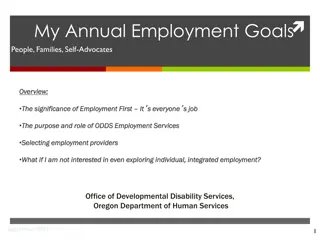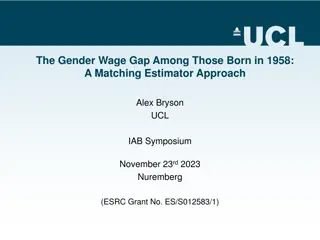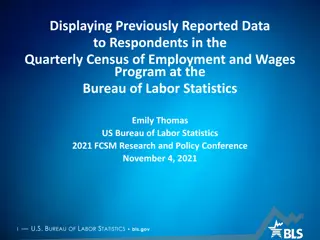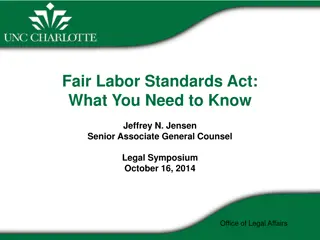Calculating Rob's Average Weekly Wage (AWW) with Concurrent Employment Examples
Rob was injured at work with a complex employment history involving multiple job roles and earnings. To determine Rob's Average Weekly Wage (AWW), we analyze his various roles, salaries, and work schedules. This includes accounting, dispatcher work, cashiering at an amusement park, and logging company engagements. We need to consider regular earnings, weeks worked, seasonal employment, and exclude certain earnings to accurately calculate his AWW.
Download Presentation

Please find below an Image/Link to download the presentation.
The content on the website is provided AS IS for your information and personal use only. It may not be sold, licensed, or shared on other websites without obtaining consent from the author. Download presentation by click this link. If you encounter any issues during the download, it is possible that the publisher has removed the file from their server.
E N D
Presentation Transcript
How Do We Calculate Rob s AWW? Concurrent Employment Examples Web Feb 2016
Rob was injured 10/1/13 at his job at Acme, Inc., where he has worked as an accountant for a year and a half 9-5 M-F. He gets a salary, which started at $650. a week. On 9/1/13 he got a raise to $700. a week. He has also worked Mon & Tue night, 4 hours per night, for $10. per hour as a dispatcher for the last two years He has also worked Saturdays during June, July & August as a cashier for a seasonal amusement park for the last two years earning $100. a week last year and $110. a week this year.
For the last several years he also worked for a logging company Wed & Thu nights doing their books for $100 a week. He quit that job on 8/20/13 (six weeks prior to injury). He just took a job on Friday nights as an on-call bouncer at a local night club. He worked there only one night prior to the injury. How will we determine Rob s AWW?
Acme, Inc. - worked as an accountant for a year and a half for a salary, which started at $650. a week. On 9/1/13 he got a raise to $700. a week. 102(4)(A) regular earnings or salary. AWW = $700. (salary at the time of the injury).
He has also worked Mon & Tue night, 4 hours per night, for $10. per hour as a dispatcher for the last two years Use 102(4)(A) regular earnings of $80/week? Regular earnings BUT not 200 days. Use 102(4)(B) AWW = total earnings divided by weeks worked Exclude week of injury if it lowers AWW
Also worked Saturdays during June, July & August as a cashier for a seasonal amusement park for the last two years. Last year he made $100. a week, this year $110. a week. Can we exclude since he had not worked since August and injury was 10/1/13? No, not if he is expected to return next year. Seasonal employment, less than 26 weeks Use 102(4)(C) Seasonal AWW = prior calendar year earnings divided by 52 What if he made $200/week this year?
Last several years also worked for a logging company Wed & Thu nights doing their books for $100 a week. He quit that job 8/15/13. Is this a concurrent employer? No, exclude from AWW calculation because he quit prior to the injury. If he had not quit - would it be seasonal because it s a logging company? No, Rob is not hauling or harvesting logs.
Just took a job on Friday nights as an on-call bouncer at a local night club. He worked there only one night prior to the injury. Can 102(4)(A), (B), or (C) be reasonably and fairly applied? Probably not. Use 102(4)(D), obtaining at least two comparables
Robs AWW = sum of: AWW for employer of injury - $700 under 102(4)(A), plus AWW for dispatcher job - total earnings divided by weeks worked under 102(4)(B), plus AWW for seasonal cashier job prior calendar years earnings / 52 under 102(4)(C), plus AWW for bouncer job under 102(4)(D) Do not include bookkeeping job quit 6 weeks ago

























